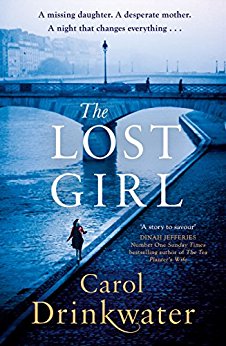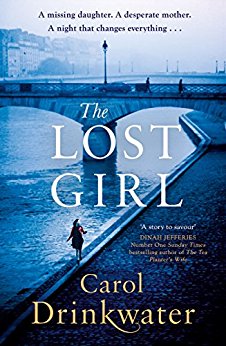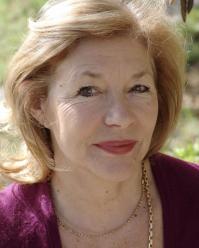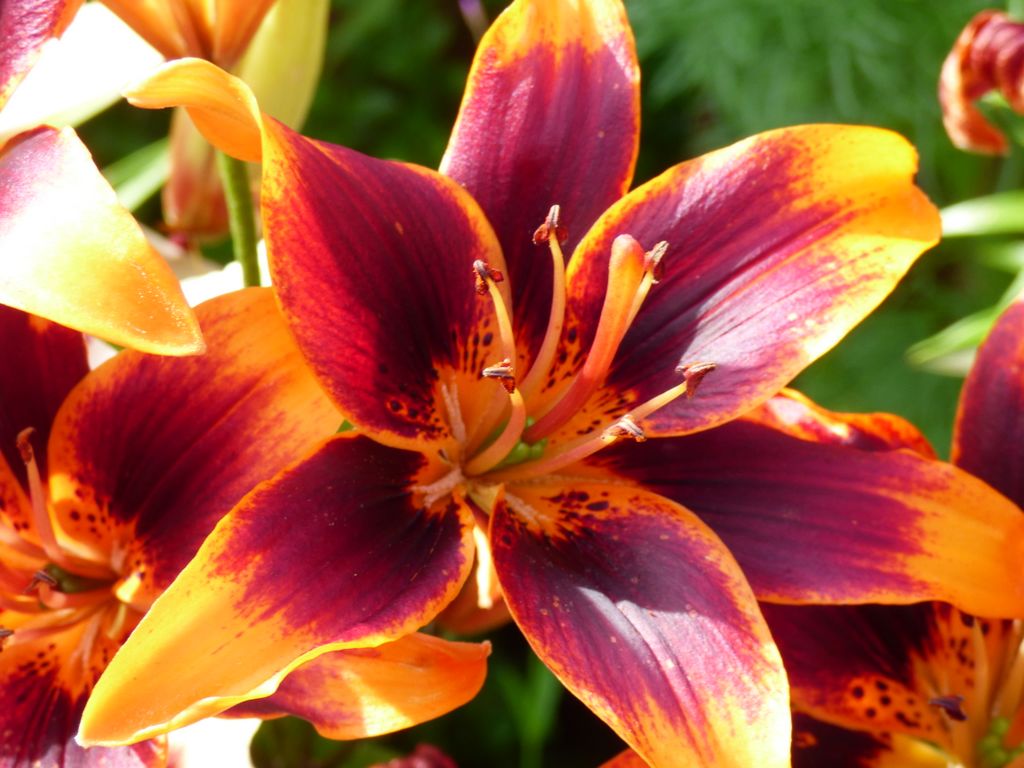
Oh my goodness am I excited today. I absolutely loved The Lost Girl by Carol Drinkwater when it was published and was lucky enough to review it and host an extract here. Carol’s writing always touches me and I have also reviewed another of her books on Linda’s Book Bag – The Forgotten Summer – here. Imagine then, how exciting it is for me to be able to interview Carol all about her writing, especially as her latest book The Lost Girl has so many resonances in recent times.
The Lost Girl was published on 29th June 2017 by Michael Joseph, an imprint of Penguin, and is available for purchase via the links here.
The Lost Girl

Her daughter disappeared four years ago. . .
Since her daughter went missing four years earlier, celebrated photographer Kurtiz Ross has been a woman alone. Her only companion her camera. Since Lizzie disappeared, she has blamed and isolated herself, given up hope. Until, out of the blue, an unexpected sighting of Lizzie is made in Paris.
Could this lead to the reconciliation she has dreamed of?
Within hours of Kurtiz arriving in Paris, the City of Light is plunged into a night of hell when a series of terrorist attacks bring the city to a standstill. Amid the fear and chaos, a hand reaches out. A sympathetic stranger in a café offers to help Kurtiz find her daughter.
A stranger’s guiding light
Neither knows what this harrowing night will deliver, but the other woman’s kindness – and her stories of her own love and loss in post-war Provence – shine light into the shadows, restoring hope, bringing the unexpected. Out of darkness and despair, new life rises. New beginnings unfold.
Dare she believe in a miracle?
Set during a time of bloodshed and chaos in one of the most beautiful cities on earth and along the warm fragrant shores of the Mediterranean, Kurtiz discovers that miracles really can happen . . .
An Interview with Carol Drinkwater
Welcome to Linda’s Book Bag, Carol. Thank you so much for agreeing to answer some questions on my blog about your writing and The Lost Girl in particular. I’m really excited that you’re here! Firstly, please could you tell me a little about yourself?
I am of Irish blood on my mother’s side and a little bit on my father’s side too though I was born in London. I have an Irish passport and chose Ireland as my mother country early in adulthood. I was educated at an Irish convent in Kent, and hated almost every minute of it. It did offer me the opportunity to study languages which I love. Spanish, Italian and French, all of which have stood me in good stead as a traveller and a writer and, of course, as a French resident. The nuns also allowed me to indulge in my love of acting and drama. After I left the convent I worked backstage in the theatre in London before going to drama school in north London. There I studied acting and classical drama.
I live in France on an olive farm overlooking the Bay of Cannes. I ended up here because I fell in love with a Frenchman who asked me to marry him on our first date in Sydney, Australia. This love story is the basis of my Olive Farm series of six books.
I still keep a small bolthole near where my mother was born in Ireland. Keeping in touch with my roots is very important to me.
Why do you write?
I HAVE TO. I need to create or I drive myself insane. If I am not writing or acting or preparing a film it is as though I have a swarm of delinquent bees inside me, buzzing and stinging.
(What a fabulous analogy!)
When did you realise you were going to be a writer?
I have been writing since I was about eight. I KNEW I would act; I DREAMED of being a writer.
Which aspects of your writing do you find easiest and most difficult?
All of it is difficult. The fun bit is looking at the books line up on the shelves. I am writing my 24th now. Yay!
(Yay indeed. I can’t wait!)
What are your writing routines and where do you do most of your writing?
I begin early and write long hours, stopping for a couple of hours mid-afternoon to swim, walk, ponder, rest my mind. Then back to it for another couple of hours so that it is in my head ready to sleep on it.
Many of your reading fans also know you as an actress. What has being involved in drama added to your writing?
I think visually. I see every scene clearly. The way people look, move, dress. The details are essential. I look for the drama, the resistance in any moment, which creates drama in scenes. I aim to draw the inner lives of my characters as they seek to overcome obstacles. While writing I act out every scene, play every part aloud. The training I received at Drama Centre, London was perfect for writers.
(How fascinating – I’d never have thought of acting out what I write.)
You’re obviously very creative with both acting and writing as part of your skill set. Is there a creative talent you haven’t mastered but would like to?
I have no musical skills except that I love to dance and listen to music. My father was a musician and I am very sad that as a child I did not learn any musical instrument. I am considering either brushing up on my Spanish and Italian, learning Arabic (difficult!!) or learning to play the guitar. But with everything I have going on in my life I probably won’t get round to any of it.
Without spoiling the plot, please could you tell us a bit about The Lost Girl?
The Lost Girl is the story of two very different women. They meet in a bistro in Paris on the night of the November 2015 terrorist attacks on the city. Over that weekend, their stories unfold.
The book is set in two time frames: November 2015 during the weekend of those terrorist attacks that rocked and shocked Paris, leaving more than a hundred dead and many more wounded. The second time frame is the glorious, headily-scented, post-war south of France, amongst the flower farms that fed the perfume industry in Grasse, the Perfume Capital of the World. The modern part of the story is darker, grittier, I think, than the earlier story. Both are told through the eyes and experiences of the two female protagonists women who meet in the bistro in Paris on 13th November 2015.
At its core, The Lost Girl is a love story with a twist, a miracle that, I hope, redeems the darker side of the story offering hope and new beginnings.
How did you manage the two time frames when you were writing The Lost Girl?
I wrote the two stories at the same time. There was no definite order to it. Sometimes I wrote Marguerite’s story for days, weeks, and then one day I would return to Kurtiz. When I was stuck I would write a scene from one or other of their live even if I knew I would not use it later. It was important to keep telling myself their stories. The big challenge was putting it all together. This part took weeks.
The plot of The Lost Girl is based around the terrorist attacks in Paris. How did you come to the decision to write around such an emotive topic?
I watched the unfolding of the attacks on the news on that November Friday night. I was with my mother. We stood together with our arms round one another witnessing the horrors. I was weeping. When the TV reporters announced that 1,500 concert-goers were locked inside the Bataclan concert hall and had been taken hostage, Mummy said to me: “for everyone inside there fearing for their lives, there is a mother outside anxiously waiting for news”. It sowed the seed for my story.
One of the two women who is in the Parisian bistro is waiting to hear news of her daughter who went missing from her home in London when she was sixteen. She, Kurtiz, the girl’s mother, and her husband have reason to believe that their daughter, Lizzie, might be attending the concert at the Bataclan.
How did you go about researching detail and ensuring The Lost Girl was realistic whilst still making it a fiction?
I spent a month at the National Library in Paris in their media division. I watched, listened to footage, recordings from that weekend and afterwards. I researched very thoroughly. I owed it to the family members of those who lost their lives to make it accurate. Even if they never read the book.
(I think that level of care comes across very strongly to the reader Carol.)
How important is literature in exploring the difficult situations, emotional and political events of modern times do you think?
Essential. Think of Pablo Picasso’s stupendous work Guernica, a visually alarming, angry statement against the senseless lives lost during the bombing of Guernica in northern Spain in April 1937. Many of the Greek tragedies were observations on the nation’s enthusiasm for war. Lysistrata by Aristophanes is a Greek comedy written and first performed in 411 BC. It recounts the story of one woman, Lysistrata, who persuades the women of Greece to withhold sexual favours from their husbands and lovers until they stop fighting and negotiate peace. It is an early, brilliant anti-war piece of theatre.
I believe literature, film, theatre, music and art can be the voices of sanity, of reason. They give us emotional air to breathe, you might say. While the media plasters on the doom and gloom, frequently inciting hatred, racism, mistrust, art can offer us hope, laughter, release, a way forward. Humans are complex, our emotions and experiences are prisms, spectrums of colours, of light and shade. Mostly, we struggle to overcome our darker instincts; we strive for goodness, not evil. Evil is the exception. Most of us desire peace, love, harmony. Even in our darkest hours we search for the lighter moments. I have seen this over and over again in war zones, areas of conflict. The chink of light. This is what I hope The Lost Girl does. It is a story of generosity, regeneration, or that is certainly what I set out to achieve.
(Very powerfully said. And you certainly achieve what you set out to do in The Lost Girl.)
France has become a huge part of your life. How important is location to you as an author when you are writing?
I feel location, if one can say that. I breathe in the perfumes, the temperatures. Every blade of grass counts. I like to immerse myself in the places I am writing about and almost always go to the chosen locations to “live” the place before setting pen to paper.
That said, The Lost Girl seems to take you further away from your Olive Farm books. How has this change in your writing evolved?
I think it is important for me as a writer to evolve. I would not want to have played Helen Herriot for all my life (which is why I left the series). I need new challenges or I stultify.
So what can we expect next from Carol Drinkwater, the writer?
I never know what I will be writing until I have written it! I am at work on a book which, I THINK, is more of a chamber piece. At the moment it also covers two time frames (though this could change!). It is a relationship story, a love story, also set in France.
If you could choose to be a character from The Lost Girl, who would you be and why?
Marguerite, of course, because she’s an actress. Or on another day, it would be Kurtiz because she has fought to become an independent woman.
If The Lost Girl became a film, would you consider taking on one of the roles?
YES!
When you’re not writing, what do you like to read?
I go through phases. At present, as it is summer and I am taking some time off, I am reading modern, mainly light fiction, mostly by female writers: Ferrante, re-reading Du Maurier, a few commercial novels on sale for my Kindle, writers I probably would never usually choose …
If you had 15 words to persuade a reader that The Lost Girl should be their next read, what would you say?
From reviews: “beautifully written”, “page-turner”, “fabulously written”, “action-packed”, “emotive”, “captivating”, “hated finishing it”, “novel of hope”
Thank you so much for your time, Carol, in answering my questions.
Thank YOU very much.
About Carol Drinkwater

Carol Drinkwater is a multi-award-winning actress who is best known for her portrayal of Helen Herriot in the BBC television series All Creatures Great and Small. She is also the author of over twenty books, both fiction and non-fiction. Her quartet of memoirs set on her olive farm in the south of France have sold over a million copies worldwide and her solo journey round the Mediterranean in search of the Olive tree’s mythical secrets inspired a five-part documentary film series, The Olive Route.

Ah, one for me, I think.Thanks both x
LikeLiked by 1 person
Definitely Judith!
LikeLiked by 1 person
Sounds good thanks Linda. 🙂
LikeLiked by 1 person
Book & interview….both v interesting Tx Linda.
LikeLiked by 1 person
Thanks for calling by lovely!
LikeLiked by 1 person
Loved this interview Linda! Now I know why Carol looks so familiar (was a huge fan of All Creatures!) While I’m ridiculously jealous to hear that Carol is living on an olive farm in France, it’s great to hear an author speak so honestly about the writing process. Love the cover too 🙂
LikeLiked by 1 person
Thanks so much for calling by Evie! Isn’t Carol a fabulous actor and author?
LikeLiked by 1 person